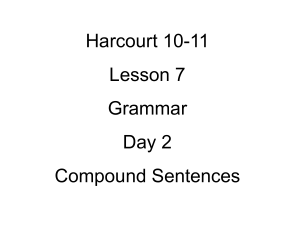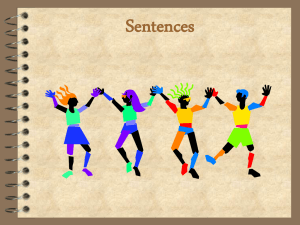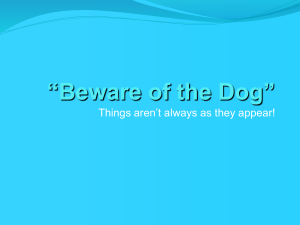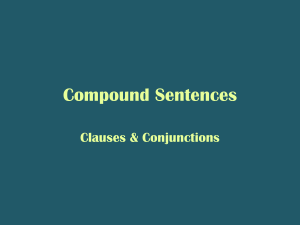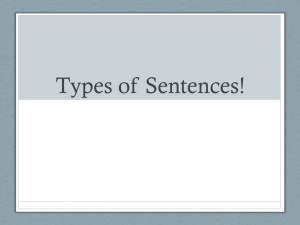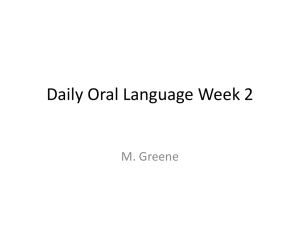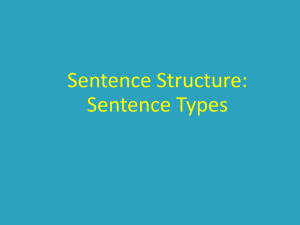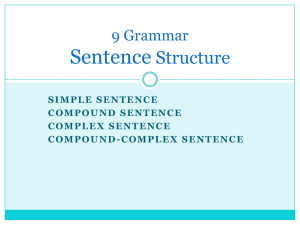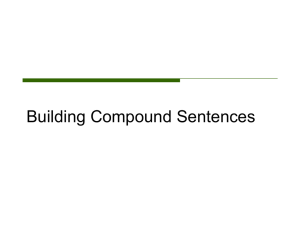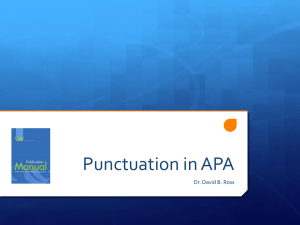Reviewing Basic Sentence Patterns
advertisement
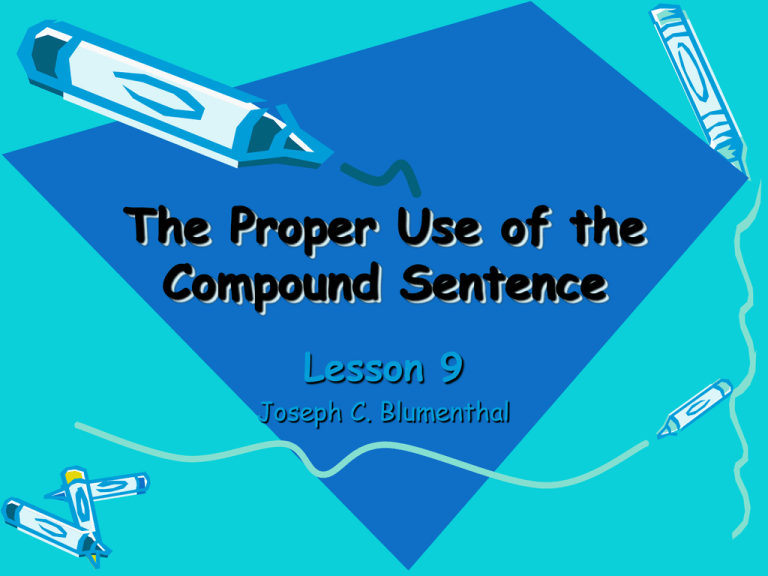
The Proper Use of the Compound Sentence Lesson 9 Joseph C. Blumenthal A compound sentence is very easy to make. We merely need to combine two simple sentences by using one of these conjunctions: and, ____, or _____. A compound sentence is very easy to make. We merely need to combine two simple sentences by using one of these conjunctions: and, _but_, or __or__. Because compound sentences are so easy to make, we must avoid overusing them. Use a compound sentence to combine only similar or related ideas that are of equal importance. Bob studies Spanish, and our school has a gym. Should these two ideas have been combined? (Yes, No) Because compound sentences are so easy to make, we must avoid overusing them. Use a compound sentence to combine only similar or related ideas that are of equal importance. Bob studies Spanish, and our school has a gym. Should these two ideas have been combined? (Yes, No) a. Bob studies Spanish, and our school has a gym. b. Bob studies Spanish, and Carol studies French. Which compound sentence is better because the ideas are similar? (a, b) a. Bob studies Spanish, and our school has a gym. b. Bob studies Spanish, and Carol studies French. Which compound sentence is better because the ideas are similar? (a, b) Our tree is small. It gives very little shade. Because there is a relationship between the size of the tree and the amount of shade, these sentences would make a (good, poor) compound sentence. Our tree is small. It gives very little shade. Because there is a relationship between the size of the tree and the amount of shade, these sentences would make a (good, poor) compound sentence. Our tree is small. We bought it at a nursery. Although both these sentences are about a tree, they have little relationship to each other. Therefore, they would make a (good, poor) compound sentence. Our tree is small. We bought it at a nursery. Although both these sentences are about a tree, they have little relationship to each other. Therefore, they would make a (good, poor) compound sentence. a. Our tree is small, and it gives very little shade. b. Our tree is small, and we bought it at a nursery. Which compound is better? (a, b) a. Our tree is small, and it gives very little shade. b. Our tree is small, and we bought it at a nursery. Which compound is better? (a, b) The two parts of a compound sentence should be equal in importance. The Millers have a dog, and it is brown. The fact that the dog is brown is much less important than the fact that the Millers have a dog. Is this a good compound sentence? (Yes, No) The two parts of a compound sentence should be equal in importance. The Millers have a dog, and it is brown. The fact that the dog is brown is much less important than the fact that the Millers have a dog. Is this a good compound sentence? (Yes, No) a. The Millers have a brown dog. b. The Millers have a dog, and it is brown. Sentence a is a simple sentence; sentence b is a compound sentence. The sentence which is better because it doesn’t give too much importance to the color of the dog is the (simple, compound) sentence. a. The Millers have a brown dog. b. The Millers have a dog, and it is brown. Sentence a is a simple sentence; sentence b is a compound sentence. The sentence which is better because it doesn’t give too much importance to the color of the dog is the (simple, compound) sentence. We have an old apple tree, and it is in our back yard. The important fact is that we have an apple tree. Whether it is located in the back yard or the front yard is a mere detail. The two ideas are (equal, unequal) in importance. We have an old apple tree, and it is in our back yard. The important fact is that we have an apple tree. Whether it is located in the back yard or the front yard is a mere detail. The two ideas are (equal, unequal) in importance. a. We have an old apple tree in our back yard. b. We have an apple tree, and it is in our back yard. Sentence a is simple; sentence b is compound. The sentence which is better because it doesn’t give too much importance to the location of the tree is the (simple, compound) sentence. a. We have an old apple tree in our back yard. b. We have an apple tree, and it is in our back yard. Sentence a is simple; sentence b is compound. The sentence which is better because it doesn’t give too much importance to the location of the tree is the (simple, compound) sentence. a. She bought an old lamp at a rummage sale, and it was brass. b. She bought an old lamp at a rummage sale, and it turned out to be a valuable antique. Which compound sentence is better because the two ideas are more nearly equal importance? (a, b) a. She bought an old lamp at a rummage sale, and it was brass. b. She bought an old lamp at a rummage sale, and it turned out to be a valuable antique. Which compound sentence is better because the two ideas are more nearly equal importance? (a, b) a. The house was attractive. The neighborhood appealed to us. b. The house was attractive. Rents are high in our city. Which pair of sentences would make a better compound sentence because their ideas are similar? (a, b) a. The house was attractive. The neighborhood appealed to us. b. The house was attractive. Rents are high in our city. Which pair of sentences would make a better compound sentence because their ideas are similar? (a, b) a. Brad apologized to Cathy. She was with her sister. b. Brad apologized to Cathy. She accepted his apology. Which pair of sentences would make a better compound sentence because their ideas are related? (a, b) a. Brad apologized to Cathy. She was with her sister. b. Brad apologized to Cathy. She accepted his apology. Which pair of sentences would make a better compound sentence because their ideas are related? (a, b) a. Cars were a luxury in those days, and they did not have self-starters. b. Cars were a luxury in those days, and few people could afford them. Which is a better compound sentence? (a, b) a. Cars were a luxury in those days, and they did not have self-starters. b. Cars were a luxury in those days, and few people could afford them. Which is a better compound sentence? (a, b) a. My birthday was approaching, and I was beginning to think about gifts. b. My birthday was approaching, and I had always wanted to go deer hunting. Which is a better compound sentence? (a, b) a. My birthday was approaching, and I was beginning to think about gifts. b. My birthday was approaching, and I had always wanted to go deer hunting. Which is a better compound sentence? (a, b) You can always add salt to your food, but you cannot remove it once it is in. The first part of this sentence concerns adding salt to food; the second part concerns removing it. This compound sentence, therefore, is (good, poor). You can always add salt to your food, but you cannot remove it once it is in. The first part of this sentence concerns adding salt to food; the second part concerns removing it. This compound sentence, therefore, is (good, poor). Arthur drove most of the way, and we had two flat tires. This compound sentence, therefore, is (good, poor). Arthur drove most of the way, and we had two flat tires. This compound sentence, therefore, is (good, poor). We cannot prevent tornadoes, but we can minimize their destructiveness. This compound sentence, therefore, is (good, poor). We cannot prevent tornadoes, but we can minimize their destructiveness. This compound sentence, therefore, is (good, poor). The car had no lights, and the accident occurred on our corner. This compound sentence, therefore, is (good, poor). The car had no lights, and the accident occurred on our corner. This compound sentence, therefore, is (good, poor). Use a compound sentence when you want your reader to think of two ideas in connection with each other. a. The engine runs smoothly. It uses too much gas. b. The engine runs smoothly, but it uses too much gas. Which arrangement brings the two ideas into closer relationship? (a, b) Use a compound sentence when you want your reader to think of two ideas in connection with each other. a. The engine runs smoothly. It uses too much gas. b. The engine runs smoothly, but it uses too much gas. Which arrangement brings the two ideas into closer relationship? (a, b) a. You must shut the gate, or the dog will get out. b. You must shut the gate. The dog will get out. Which arrangement brings out the relationship between the two ideas more clearly? (a, b) a. You must shut the gate, or the dog will get out. b. You must shut the gate. The dog will get out. Which arrangement brings out the relationship between the two ideas more clearly? (a, b) a. I liked the dog. It was a collie. b. I liked the dog. The dog liked me. Which pair of sentences would you connect with and to bring the two ideas into a closer relationship? (a, b) a. I liked the dog. It was a collie. b. I liked the dog. The dog liked me. Which pair of sentences would you connect with and to bring the two ideas into a closer relationship? (a, b) I liked the dog. The dog liked me. Because both parts of the sentences concern the relationship between the person and the dog, this is a (good, poor) compound sentence. I liked the dog. The dog liked me. Because both parts of the sentences concern the relationship between the person and the dog, this is a (good, poor) compound sentence. a. I was born in Utah. Our family soon moved to Oregon. b. I was born in Utah. This state has magnificent scenery. Which pair of sentences could better be combined into a compound sentence? (a, b) a. I was born in Utah. Our family soon moved to Oregon. b. I was born in Utah. This state has magnificent scenery. Which pair of sentences could better be combined into a compound sentence? (a, b) I was born in Utah, but our family soon moved to Oregon. This is a good compound sentence because both parts concern (location, growth). I was born in Utah, but our family soon moved to Oregon. This is a good compound sentence because both parts concern (location, growth). Use the conjunction and merely to add one new idea to another. Use the conjunction but to point out a contrast or contradiction between the two ideas. I didn’t want a reward,…Mr. Lopez made me take it. Would and or but make better sense in this sentence? (and, but) Use the conjunction and merely to add one new idea to another. Use the conjunction but to point out a contrast or contradiction between the two ideas. I didn’t want a reward,…Mr. Lopez made me take it. Would and or but make better sense in this sentence? (and, but) Use the conjunction or to express a choice between two ideas. a. I steered for the shore, … the wind kept turning the boat. b. The course is getting harder, … I am getting lazier. In which sentence would or make good sense? (a, b) Use the conjunction or to express a choice between two ideas. a. I steered for the shore, … the wind kept turning the boat. b. The course is getting harder, … I am getting lazier. In which sentence would or make good sense? (a, b) Write the following answers on your own sheet of paper. Our school is small … we have good teams. 1. Which conjunction would bring out the meaning more clearly? (and, but) Hockey originated in Canada, … many of the best players are Canadian. 2. Which conjunction would bring out the meaning more clearly? (and, but) Machinery is supposed to make life easier, … people seem to be busier than ever. 3. Which conjunction would bring out the meaning more clearly? (and, but) It is not a good idea to begin a sentence with a conjunction. Let the conjunction stand between the two parts of a sentence where it can do its job of connecting. a. It was a hot day. And all the windows were open. b. It was a hot day, and all the windows were open. 4. The conjunction and is properly used in (a, b). a. I dropped the light bulb, but it didn’t break. b. I dropped the light bulb. But it didn’t break. 5. The conjunction but is properly used in (a, b). a. You must follow the recipe precisely. Or the fudge will be a failure. b. You must follow the recipe precisely, or the fudge will be failure. 6. The conjunction or is properly used in (a, b). You are done!!!
